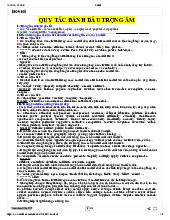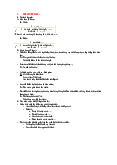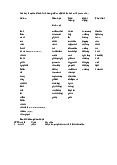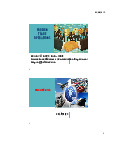






Preview text:
16:21 9/8/24 Distraction in study
Facebook can be an incredible tool for students, where they can search for
many information. According to, the American Psychological Association,
(2009, p. 456) internet and related technologies have the power to bring
literature, research, information, and people from around the world directly
into the classroom. However, Facebook is hugely distracting students from
their studying. There is a survey conducted by Tindell and Bohlander (2019)
there are 92% of college students reported that they used to send text
messages during class. Through these surveys, the first thing that distracts
students in class is texting friends. The popularity of text messaging has long
been given as one of the main reasons why Facebook is a distraction in the
classroom. If students are texting, they're not paying attention. Besides
texting in class, students also spend their time playing games on it and
watching videos. While spending too much time playing games and watching
videos will make students uninterested to read books or doing revisions and
fail their exams. They tend to play games in class more than at home
because learning now no longer attracts them. Another way to understand
distraction is to look at the research conducted by neuroscientist Adam Aron
of the University of California San Diego and postdoctoral scholar Jan
Wessel. They found that the brain system that is involved in interrupting or
stopping movement in our bodies also interrupts cognition. This area of the
brain is engaged when you make an abrupt stop in action due to an
unexpected event like a text message or a notification clearing out what you
were thinking (or what the teacher was teaching). This function of the brain
used to serve an important role when humans were faced with danger and
needed to focus on what was happening at that moment. Although the
students had been told at the outset that they should “study something
important, including homework, an upcoming examination or project, or
reading a book for a course,” it wasn’t long before their attention drifted:
Students’ “on-task behavior” started declining around the two-minute mark
as they began responding to arriving texts or checking their Facebook feeds.
According to, Mina Suk “by the time the 15 minutes were up, they had spent
only about 65 percent of the observation period actually doing their about:blank 1/7 16:21 9/8/24 Distraction in study
schoolwork”. Besides, students can easily fall asleep in class. The fact that
most students surf facebook until late at night replying to texts, making calls
for hours, playing games, or watching videos. A poor night's sleep will make
them lazy to get up in the morning and always feel tired and lethargic when
going to school. They are also likely to fall asleep in the classroom and
therefore, miss the topics taught by their teachers. That is the biggest problem of all time.
Those are the content of our gr presentation. We just talk about 4 negative influences of Facebook.
Facebook addiction, mental and physical health problems, misunderstandings of information, and
distraction. That is why we should limit the use of Facebook.
That is the end of our resentaion. Thank you for listening. If you have any questions, feel free to ask. Four
+ Internet and related technologies have the power to bring literature,
research, information, and people from around the world directly into the
classroom. (the American Psychological Association, 2009, p. 456)
https://www.tandfonline.com/doi/abs/10.1080/21532974.2012.10784686
+ Tindell and Bohlander (2019), The use and abuse of cell phones and text
messaging in the classroom: A survey of college students. College Teaching, 60. 1-9.
https://stockton.edu/ctld/documents/facres/mobile-devices-in-the- classroom.pdf
+ neuroscientist Adam Aron of the University of California San Diego and
postdoctoral scholar Jan Wessel https://today.ucsd.edu/story/
brains_stopping_system_may_derail_train_of_thought about:blank 2/7 16:21 9/8/24 Distraction in study
+ “by the time the 15 minutes were up, they had spent only about 65 percent
of the observation period actually doing their schoolwork”
https://www.minasuk.com/youll-never-learn-students-cant-resist/?
utm_source=rss&utm_medium=rss&utm_campaign=youll-never-learn- students-cant-resist about:blank 3/7 16:21 9/8/24 Distraction in study about:blank 4/7 16:21 9/8/24 Distraction in study about:blank 5/7 16:21 9/8/24 Distraction in study about:blank 6/7 16:21 9/8/24 Distraction in study about:blank 7/7




